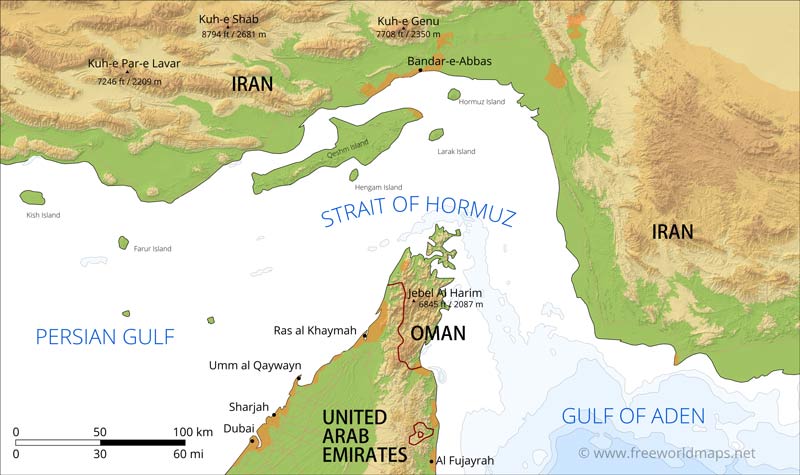Impact on India of Conflict in the Straits of Hormuz
The Iran-Israel conflict has witnessed asymmetric organisations backed by Iran attack Israel with missile capabilities. In addition, Iran has used missiles directly against Israel.
Such actions have become worrisome not only from the perspective of traditional security challenges but also from the perspective of non-traditional security challenges.
One of these non-traditional security challenges is the rise in oil prices that could result in the rise in prices of other goods and services leading to a state of inflation in economy of a state.
Iran’s reported missile attacks against Israel, and a fear of possible Israeli attack on Iranian oil fields and nuclear facilities have become a concern globally. The price of oil has incremented owing to the growing apprehensions of oil security. In October 2024, there were reports that oil prices has risen to three percent after Iran fired salvos of ballistic missiles against Israel.
There are concerns that such missile attacks could also affect oil supplies adversely in the region making the oil market one of the most volatile markets in the world at the moment. There are also concerns that these attacks may worsen in case the United States tightens its sanctions against Iran.
Iran is the seventh largest oil exporter in the world and any disruption in its oil production could result in adverse affects in the oil market. In addition, there are other complexities with missile attacks in the region that bear adverse impacts on oil market.
Iranian proxy groups like the Houthis and Hezbollahs possess anti-ship capabilities that directly threaten the Strait of Hormuz. Iran’s own anti-ship capabilities also threaten the Strait of Hormuz through which oil tankers pass by. Blocking such passages through missile attacks could severely sabotage the global oil market and also affect the related non-traditional security challenges like food security, electricity, transportation to name a few.
There should be no surprise to expect such actions in the near future as in the past during the Tanker War, Iran and Iraq had used missiles in approximately eighty percent of their attacks on commercial ships.
In 2024, a Panamanian-flagged tanker carrying crude oil bound for India was struck by a missile launched from Yemen in the Red Sea. The same year China bound oil tanker was hit by missiles by Houthis in Red Sea. In March 2024, Houthi missiles also killed sea-farers, thus, risking global trade by affecting supply chain constraints.
Amid such developments, the Strait of Hormuz, known as world’s most important oil artery, located between Oman and Iran and being the most important oil transit chokepoint as it allows large amount of oil to pass through the narrow Strait, remains a major worrying factor for global security. Choke points are narrow water passage along global sea trade routes critical to global trade. Disruption of choke points could create supply delays and raise cost of shipment of oil thereby, increasing overall expenses.
Middle East countries like Saudi Arabia are major users of this chokepoint to transport crude oil globally. Other countries like Kuwait, Qatar and UAE send their crude through this Strait. For example, Qatar, world’s biggest liquefied natural gas (LNG) exporter sends almost all of its LNG through the Strait. Missile attacks threaten the security of safe passage of such crucial commodities.
Impact on India
The strategic significance of the Strait of Hormuz is crucial to India’s economic growth also. Hence, disruptions in supply chain of oil shipments could jeopardise its non-traditional as well as traditional security due to price volatility in oil owing to disruptions, considering that New Delhi is the third highest oil importer. These could include aviation, automotives, chemicals, cement, paint, gems and jewels (that include gold and silver) and many more.
Thus, navigating through the challenges of soaring oil prices could become a challenge for domestic politics. Already export industries like low-end engineering products, textiles, garments, and other labour-intensive goods have witnessed a fall in profit margin due to this rise in crude oil prices.
Experts are of the view that India’s crude oil imports will least likely to be affected due to the tensions in the Middle East. This is because even though India does not possess any operating pipeline circumventing the Strait of Hormuz, there are alternative routes through the ‘Red Sea.’
Also, India imports considerable amount of oil from Russia also that comprise thirty percent.
But, there is no alternate route for LNG and disruption in the Strait of Hormuz could be detrimental for LNG importing.
The alternative route for crude oil transport also raises the cost of shipment affecting the domestic economy.
Such rise in crude oil prices could also prolong India’s efforts to reduce inflation rate by making it difficult for central bank, Reserve Bank of India to make any concessions.
Talking about inflation, there are also experts who have opined that unless crude oil prices rise by USD ten per barrel, the consumer price index inflation would not be impacted very adversely considering that the current account deficit would still be low. India is also making efforts to keep its wholesale price index inflation under check.
Missile trends bear testimony to the fact that hard power affects traditional security as well as non-traditional security.
Crucial choke points and critical infrastructures could be destroyed and decapitated leading to a stand-still situation.
Missiles strengthen combat capabilities and such combat capabilities affect non-traditional aspects of security.
Longer range missile systems further complicate the security calculus by affecting the non-traditional aspects of security by being capable of targeting counter-value targets or being capable of targeting strategic assets from stand-off distance.
Debalina Ghoshal is Non Resident Fellow, Council on International Policy, Advisor, Indian Aerospace and Defence News and the of the book, “Role of Ballistic and Cruise Missiles in International Security.”
Credit Map: https://www.freeworldmaps.net/ocean/hormuz-strait/

